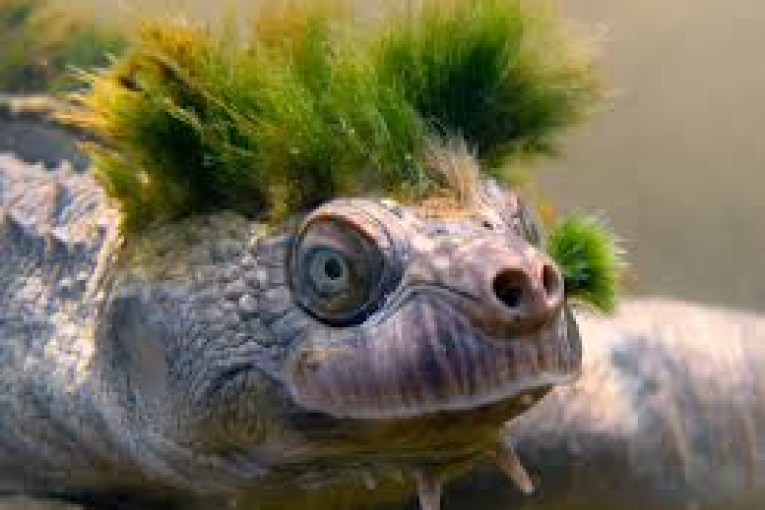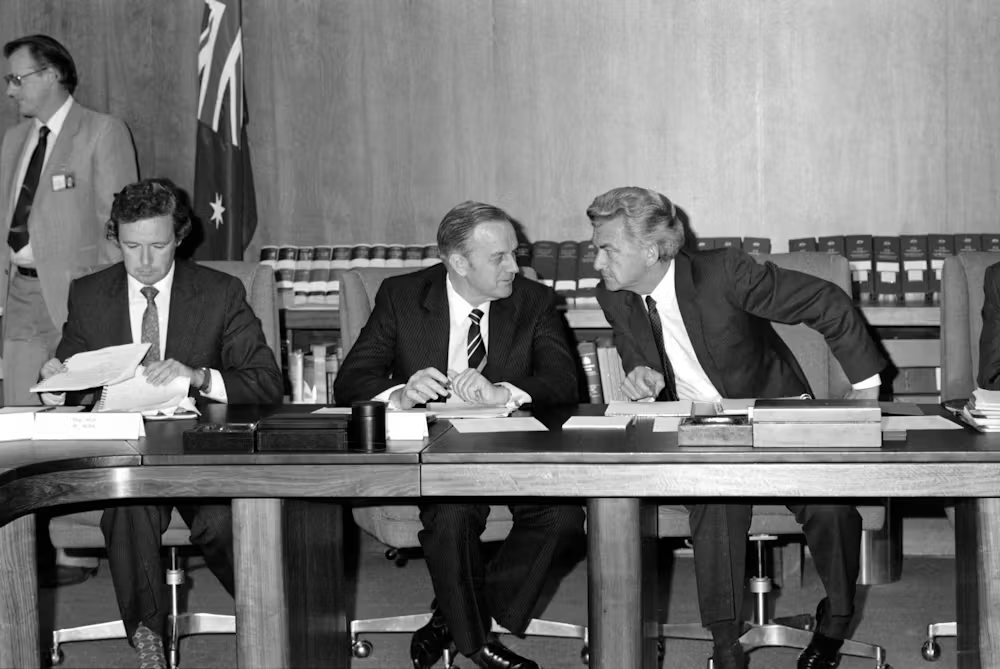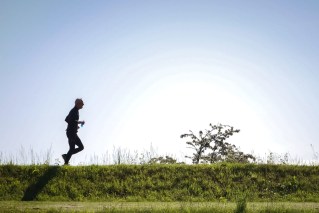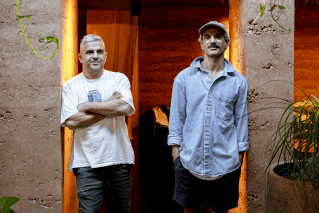My word: The eccentric, nude Queenslander who helped shape the English language
A truly amazing story about an unknown Brisbane character who in a life that was eccentric but hidden in Paddington’s lazy late night streets has come to light with a new book about the world’s greatest dictionary. Dennis Atkins reveals the fascinating truth


Two Brisbane devotees of the English language have been unveiled by a book tracing the history of the publication. (ABC image)
Chris Collier isn’t well-known in Queensland or his home town of Brisbane. However, this extraordinary character should not just be renowned, there should be a statue to him somewhere – in the streets of Brisbane’s inner west suburb, Paddington.
The why is simple. Over a period of 35 years Chris Collier submitted some 100,000 slips to the Oxford English Dictionary (or OED as it’s universally known) – submissions made by individuals around the world to the most venerable repository of the English lexicon.
Collier, living in an old Queenslander in French Street, off Latrobe Terrace, was an avid reader of his local paper, The Courier-Mail. Day in, day out, he devoured its stories, panning for the gold of new words.
His neighbours didn’t know much about him, regarding him as a bit of an eccentric, someone who had quirky ways (as we will find out) but whose contribution to the English language surpasses that of anybody in not just Queensland but Australia.
Those 100,000 slips added so many words or contributed to the greater knowledge of existing words that appeared in the Oxford English dictionary.
Because of Collier, there are words the world might not have otherwise known. That paceway was a racecourse for trotters; sickie, a day off for sickness; Mad Max used to describe situations similar to events in the George Miller film franchise, gurgler for a drain and kit-off meaning nude.
This is the tip of the iceberg – a phrase itself which predates Collier’s observations and didn’t make it to the OED until 2012. We know all this because of an extraordinary few pages at the end of a truly fascinating history of the dictionary by Sarah Ogilvie, herself a Brisbane woman.
Lexicographer Ogilvie, now a history teacher at Oxford University, specialising in language, dictionaries and technology, was herself born in Brisbane where she studied before going on to Oxford University, completing doctorates in linguistics and teaching at Cambridge and Stanford.
As befits someone with a full life devoted to language and lexicography, Ogilvie’s had a storied career. While working at the OED where she not only helped with the annual compilation of updating the words in the great volumes but also buried herself in the dictionary’s history particularly around its most famous chief editors, Frederick Furnivall and James Murray (others who followed included Henry Bradley, William Craigie and Charles Onions).
Ogilvie started her thesis on the history of what is regarded by those in the word trade as the Bible, and it was published earlier this year, as The Dictionary People: the unsung heroes, who created the Oxford English Dictionary (Penguin Random House), a story told with warmth, humour and genuine insight into the lives and obsessions of so many people who have over more than two centuries, bought Britain and the world, the OED.
The characters are too many to mention to any extent really, but just dipping into this book, and reading about the mad, bad and dangerous to know, always fascinating but enormously fun folk. Without Ogilvie’s scholarship, who would’ve known that so many of people who trawled for, and found words, were not just almost addicted to the study of the development and the explanation of words were also addicted to so much more – usually deviant behaviour rooted in sexual peccadilloes or substance abuse.
However, it is Chris Collier whose story really needs to be told here in Brisbane and there’s no one better than Ms Ogilvie to tell it. “He lived in Paddington, a suburb close to where I grew up, but I had no idea of his fame at the time,” wrote Ogilvie.
“No one did. More people knew of him in Oxford than in Brisbane, even though he rarely left his neighbourhood, let alone Australia. As far as his neighbours were concerned, ‘Chris’ was the local eccentric who lived alone and was known to walk through the quiet hilly streets at midnight. He lived on French Street in a humble Queenslander a house raised on stilts in the local style with a front veranda and a corrugated iron roof, surrounded by leafy rubber trees and frangipanis.
“Piles of newspapers and movie posters blocked the windows and made it difficult to get past the front door. Mr Collier was a night owl. Every evening, after the fruit bats flew overhead in dark clouds at sunset, he sat barefoot at a wooden table in his kitchen by the light of a fluorescent tube. The local newspaper was spread in front of him with a pair of scissors, a pot of glue and hundreds of freshly cut slips alongside.
“Regardless of the heat and humidity, Mr Collier spent hours focused on his dictionary work. I don’t know if he knew the lineage behind him, the other dictionary people in equally hot corners of the world – Margaret Murray in Calcutta, Donald Ferguson in Ceylon, John Bruce Moffat in the Kalahari, Dr Atkins in New Mexico – faithfully copying out slips in the hope that they might get one word into the Dictionary,”
Ms Ogilvie reports Collier had a special technique, cutting out quotations and dipping a brush in a sweet-smelling Perkins paste glue, sticking them to slips, sometimes as many as 100 in a night. “(It was) just him, and the sound of the scissors the incessant croak of the cicadas and the greasy smell of the neighbour’s greasy lamb chops hanging in the close air,” she writes.
Then comes the shock – about midnight, Collier would stop work, gather up the scraps of paper, clear the table, turn off the light, take off his shirt, shorts and underwear, standing naked in his kitchen.
“He was ready to go out. Mr Collier was a naturist. There was no word for someone who practices or advocates a natural way of life, especially nudity, until 1926,” says Ogilvie.
“Nothing on earth was more splendid than, freeing his body of restrictions and communing with nature. Even after all these years, he still got a thrill from leaving the house naked …
“… He turned right out of his gate and up the hill towards the main street, the shock of no one stopping him. Paddington lay in silence before him and he reveled in his freedom. Nature was not his. It’s not it. Nature was at its most splendid in Brisbane. In November. The weather was warm and the jacaranda trees were in full bloom, a perfusion of pale purple blossoms, which looked white in the moonlight.
”A faint, talcum powder scent, and a soft carpet of cool petals under foot. This was Mr Collier’s happy place, wondering the streets of Paddington and collecting newspapers from the neighbours’ bins for the next day of dictionary work while everyone slept.
“None of his neighbours knew that Mr Collier volunteered for the OED or that words from their local newspapers would eventually find their way onto its authoritative pages. Thanks to his work, there is a weird bias in the OED towards quotations from the Brisbane Courier-Mail.
“It is now the 330th most frequently quoted source in the dictionary with more quotations from it than from either Virginia Woolf, TS Elliot or The Book of Common Prayer.”
What a story. The amazing thing is it’s not known in Chris Collier’s home town. As Ms Ogilvie said, Collier, who died in mid-2010, was better known in Oxford than Brisbane. I’d guess almost everyone in Brisbane reading this (from a book published more than two months ago) is doing so for the first time. Think about that.
What a contribution. It’s marvelous that Ms Ogilvie has given us Chris Collier’s story and I am delighted to have discovered it.
Just a note of acknowledgment and gratitude. I found this book through Brisbane’s best bookshop, Avid Reader in West End and its non-fiction book club, Factually Speaking. They had it as their book of the month when I joined and I’m so glad I did. Hat tip to Amy McKinnon from Avid and the convenor of this wonderful book club.
This month we’re reading Naomi Klein’s Doppelgänger. It’s another cracker although there doesn’t seem to be a Brisbane connection – yet.
(Here’s a link to the Avid Reader book club page. You won’t be disappointed: https://www.avidreader.com.au/pages/6431-BOOKCLUBS)












